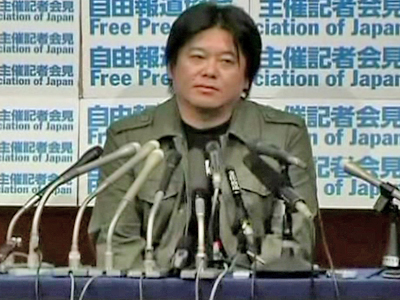
Japanese Entrepreneur Takafumi Horie Heads to Jail

Once touted as a symbol of a new, dynamic Japan, 38-year-old entrepreneur Takafumi Horie is now heading to jail.
Known for his celebrity lifestyle and aggressive takeover bids, Horie rattled corporate Japan, as he expanded Internet Company Livedoor into a conglomerate worth $6 billion at its peak.
But this week, he lost his final appeal in a fraud case, and is resigned to doing time.
[Takafumi Horie, Former Livedoor CEO]:
„There were quite a few points that I was not satisfied with and that’s why I appealed. However, as my appeal was turned down, I will indeed enter prison sometime in the next month or so.“
Japan’s Supreme Court upheld a decision by a Tokyo high court, giving Horie a two-and-a-half year sentence without suspension for padding Livedoor’s earnings and driving up its share price by giving false information to investors.
[Takafumi Horie, Former Livedoor CEO]:
„In terms of why everything got to the point that it did, I’m sure that there may be some things caused by my fault. However, I plan to study so that the same thing does not happen again. I plan on coming back to make myself useful again.“
Before his fall from grace, Horie’s bold takeover battles shook Japan’s conservative business establishment.
Horie first rose to fame in 2004, with his failed bid for a professional baseball team. A later takeover battle with a major Japanese TV network cemented his place in corporate folklore as the new model of entrepreneurship in Japan.
The two-and-a-half year prison term is unusually harsh by Japanese standards, as most white-collar criminals are often able to avoid jail time.
Horie is vowing to return to his current business in space tourism once he gets out of prison.
 Foto: NTD
Foto: NTD




























vielen Dank, dass Sie unseren Kommentar-Bereich nutzen.
Bitte verzichten Sie auf Unterstellungen, Schimpfworte, aggressive Formulierungen und Werbe-Links. Solche Kommentare werden wir nicht veröffentlichen. Dies umfasst ebenso abschweifende Kommentare, die keinen konkreten Bezug zum jeweiligen Artikel haben. Viele Kommentare waren bisher schon anregend und auf die Themen bezogen. Wir bitten Sie um eine Qualität, die den Artikeln entspricht, so haben wir alle etwas davon.
Da wir die Verantwortung für jeden veröffentlichten Kommentar tragen, geben wir Kommentare erst nach einer Prüfung frei. Je nach Aufkommen kann es deswegen zu zeitlichen Verzögerungen kommen.
Ihre Epoch Times - Redaktion